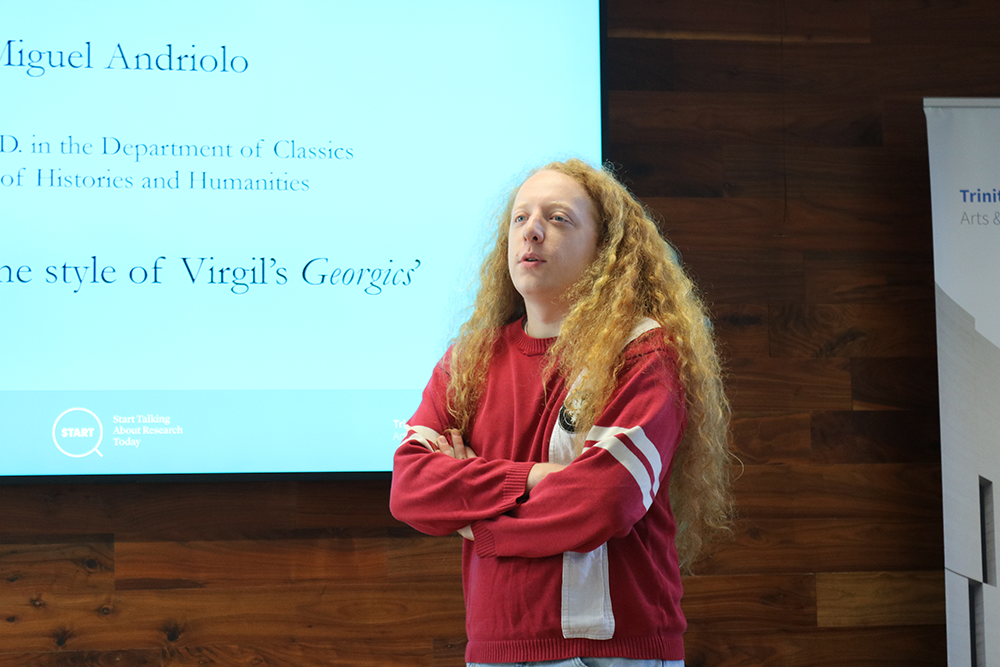Welcoming hundreds of attendees and joining forces with START: European Researchers’ Night at Trinity, the festival has cemented its place as a highlight in the College calendar celebrating the unique and impactful research coming from Trinity’s Arts and Humanities Schools and the Library.
A week-long programme of 36 events were chaired by Trinity Long Room Hub Director Patrick Geoghegan and Deputy Director Etain Tannam and began in the now customary fashion: a sit-down coffee morning with Provost Linda Doyle. This year, a number of big topics were on the table as the Provost highlighted the challenges to academic freedom across the world and the uncertain future of research in a world that appears to reject hard evidence.
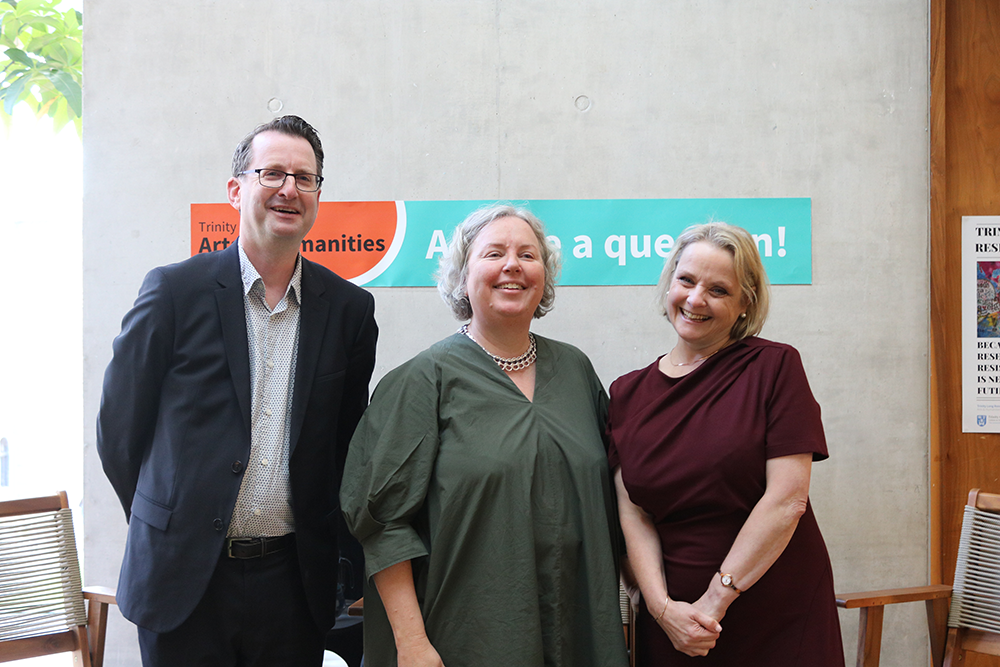
Director Patrick Geoghegan with Provost Linda Doyle and Deputy Director Etain Tannam
The role of universities in today’s world would become a key theme across this year’s festival with early career researcher Holly Ritchie (History) inviting attendees to imagine how a tour of Trinity’s uncomfortable history might illuminate different stories and find characters at its margins. Here Holly highlighted the important work that Unit 18 is doing in reaching out to Trinity’s local community around Pearse Street and making Trinity a welcoming place for all.
Dr Fáinche Ryan (Theology) brought attendees back to some other uncomfortable propositions for the contemporary university in her talk ‘The University and Truth-Telling’. Drawing on Hannah Arendt’s writings on education, Dr Ryan invited the audience to consider “what is a university and what is a university for?” Delving into Arendt’s ideas that educational institutes should be a refuge from political battles, audience members were prompted to consider the role of past and present-day student activism. Meanwhile Franciszek Krawczyk (Education) explored the role of the university in advancing international solidarity.
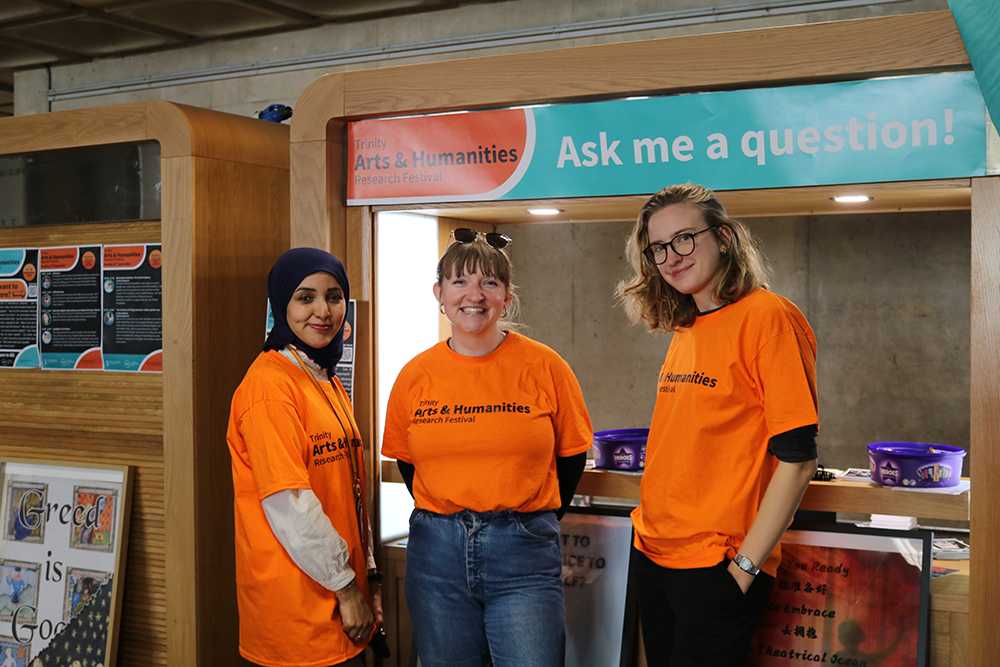
Festival ambassadors in the Arts Building (Hanan Almohideb (Linguistics) Nora Grimes (Drama Studies), and Kat Stepien (Hispanic Studies)
How should universities deal with AI and is it really reshaping the way students and researchers work? Professor Micheál Ó Siochrú joined research fellow Dr David Brown (History) to discuss how they are using AI as part of Research Ireland Advanced Laureate project ‘Cromwellian Ireland and the Transformation of the English Atlantic World (EMPIRE)’. As part of the discussion, Professor Ó Siochrú argued that universities need to be more proactive in addressing the challenges of AI while also being realistic about its widespread use.
For Friday’s festival finale, Professor Patrick Geoghegan sat down with geneticist Aoife McLysaght to discuss the intersection between policy, science and the humanities. Describing some career highlights – including becoming the face of an An Post stamp – Professor McLysaght talked about her current role as Government Science Advisor and what sparked her interest in engaging with the public around her research.
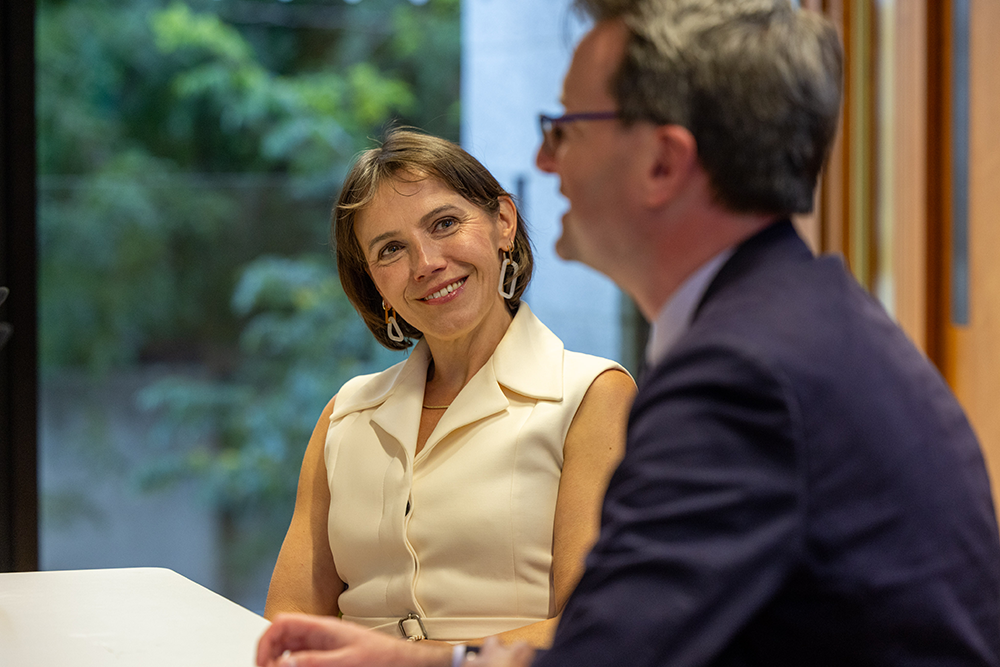
Government Science Advisor Aoife Mc Lysaght speaking with Patrick Geoghegan
Next up: crime. If you’ve committed one, what rights do you have in prison and how are Irish prisons fulling their obligations around ensuring dignity for prisoners? Not nearly enough, argued Mary Rogan (School of Law) whose pioneering research is the subject of European Research Council-funded project ‘Prison Oversight: Improving Rights in Europe (POIRE)’. Professor Rogan laid bare the damning reports of overcrowding in Irish prisons and the other factors impacting prisoners here.
Asking “Why we are so drawn to true crime?”, Monday evening’s panel convened literature experts Una Mannion (Oscar Wilde Centre), Clare Clarke, Bernice Murphy (English), and Ailise Bulfin (UCD) to discuss the ethical implications behind the many books, the TV series, and films that traverse the genre. Chaired by Professor Eve Patten (English), panellists probed why women, in particular, are the both the subject and consumers of true crime narratives, and the complexities for the real victims behind the narrative.
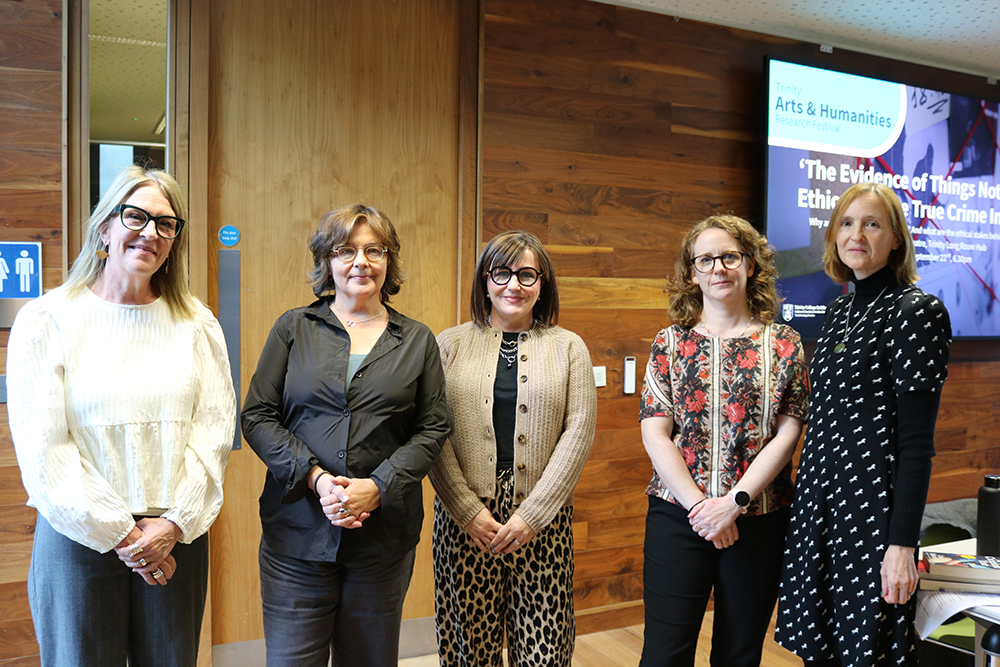
Una Mannion (Oscar Wilde Centre), Eve Patten, Clare Clarke, Bernice Murphy (English), and Ailise Bulfin (UCD)
Speaking of the real-life story behind his book The Bureau, Eoin McNamee (Oscar Wilde Centre) unpicked the ethics of mixing a personal story with fiction--and in this case the story of his father’s entanglement with borderland crime.
Sticking with the crime theme, Professor Sam Slote of the School of English outlined the long road to publication for Jame Joyce’s Ulysses, due to the alleged “obscenities” which banned the publication of the novel in the United States, leading to various legal battles. On other legal battles, Róisín Costello of Trinity’s School of Law spoke about the how the recent Kneecap trial highlights the shortcomings in providing for minority languages speakers in the courtroom.
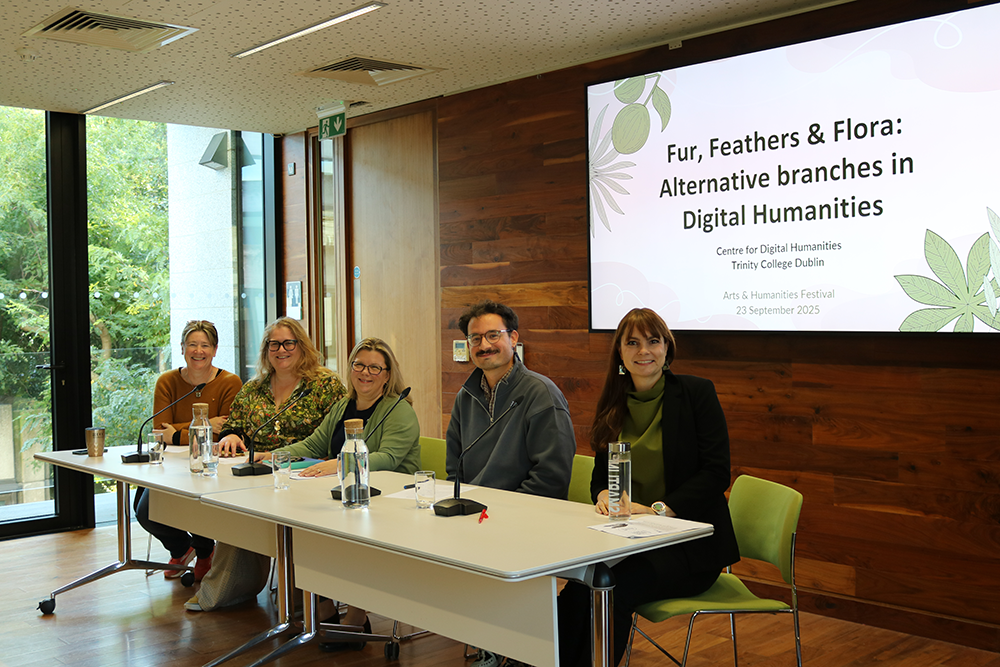
Digital Humanities panel: Joan Murphy (DARIAH-IE), Vicky Garnett (DARIAH-EU), Sharon Mora (Digital Humanities), Noel Castro Fernandez (visiting), and Nicole Basaraba (Digital Humanities)
In her talk as part of Trinity’s digital humanities panel, Dr Nicole Basaraba enlightened listeners about European outlaw narratives (ever heard the tale of “goat riders” in the Low Countries?) and how these folklore legends from Dutch and Belgian folklore appear across different media – and for her research – can be mapped through the lens of “dark tourism.”
There was music: attendees were treated to the intimacy of an open choir rehearsal on Wednesday evening with the Mornington Singers. Dr Orla Flanagan from Trinity’s Department of Music led the 40 strong ensemble as they prepare for their Longwave Concert on 18 October. This year the Festival also extended to Trinity’s Senior Common Room for a concert hosted by Dr Evangelia Rigaki (Music) showcasing works by Irish performers Gerald Barry, Deirdre McKay, Grainne Mulvey, and Raymond Dean. Musicians Darragh Morgan (violin) and Mary Cullea (piano) both enthralled and surprised audiences with these original pieces.
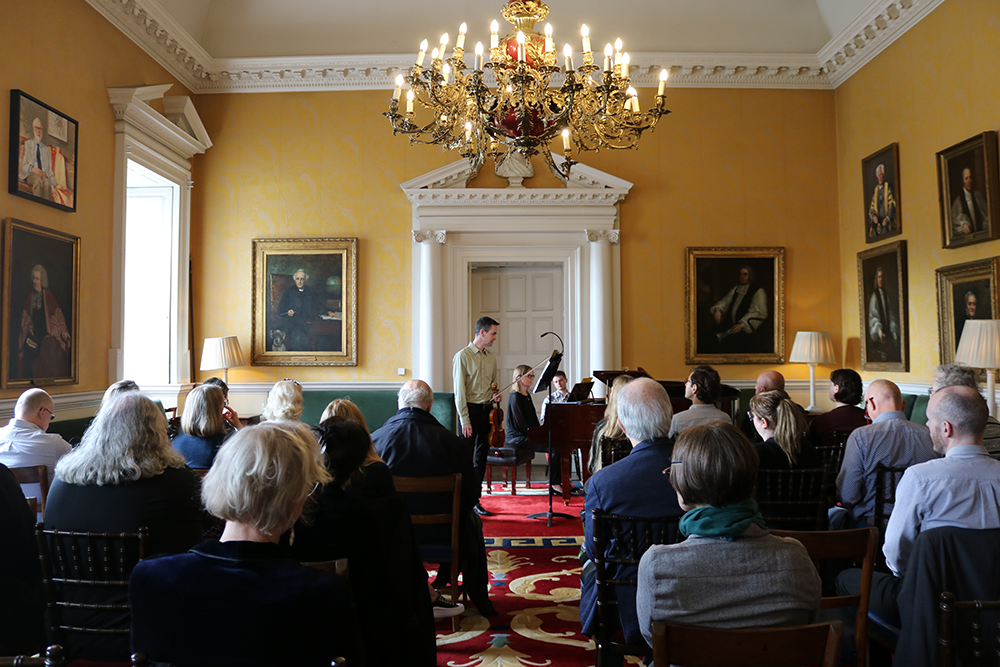
Festival concert in the Senior Common Room
There was Classics: ever a popular festival segment, Trinity’s Classics department asked if there was any rhyme in ancient Greek poetry? And why not? Challenging English playwright Ben Johnson’s quip that “Greek was free from Rime’s Infection”, Leon Wash shared evidence to the contrary, and explained what this means about what we know about Greek poetry. Similarly, Boris Kayachev (Classics) showed why rhythms, stresses and pauses in classical poetry might give is some clues as to how Latin was actually spoken. This is also the subject of his major Research Ireland funded project ‘Enjambement in Latin poetry: prosody, pragmatics and word’. This year, the Trinity Long Room Hub partnered with Once off Productions and the Dublin Theatre Festival for Gina Moxley’s production ‘I Fall Down: A Restoration Comedy’, seeking to creatively rectify women’s erasure in history of art and in classical statuary – the subject of Monday morning’s School of Creative Arts Research Forum.
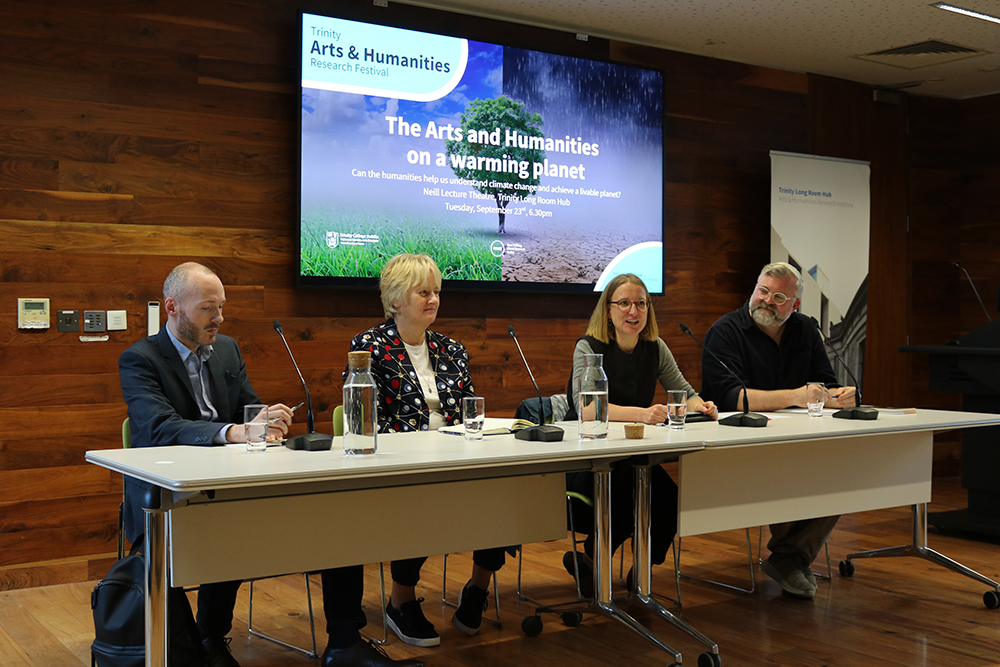
The Arts and Humanities on a Warming Planet: Jonathon Hodges (Music), Karen Wiltshire (Climate Science), Kaja Bruisch (History) and Jacob Erickson (Religion)
And politics: a big-ticket item for Monday’s festival programme was the Behind the Headlines discussion on the Irish Presidency. Expertly chaired by Professor David Kenny (Law), we went back to the beginning to see what the Presidency is about: what can presidents say or not say according to the constitution? And, what were some of the most memorable and controversial moments from President Patrick Hillery to more recent presidencies?
On the thorny issue of flags, Dr David Mitchell of Trinity’s Belfast campus for Peace Studies joined Dr Etain Tannam (Peace Studies) to explore the long-debated idea of a flag for Northern Ireland. Citing the example of the Cornish flag, Dr Mitchell argued that a flag for Northern Ireland could convey regional identity without sectarian divide. He argued it could be a flag for a “shared future”.
Taking us back to partition though, Dr Stephen O’Neill of Trinity’s School of English spoke as part of the festival edition of the Modern and Contemporary Irish History Seminar Series on how culture affects the way we see partition rather than cultural differences influencing partition, as argued by historian F.S.L. Lyons. To do this, he touched on ideas from his forthcoming book Irish Culture and Partition, 1920–1955 (Liverpool University Press, 2026) and looked at the role of writers’ association P.E.N. International and its Irish the polemics of its Irish congress in 1953 jointly hosted in Belfast and Dublin.
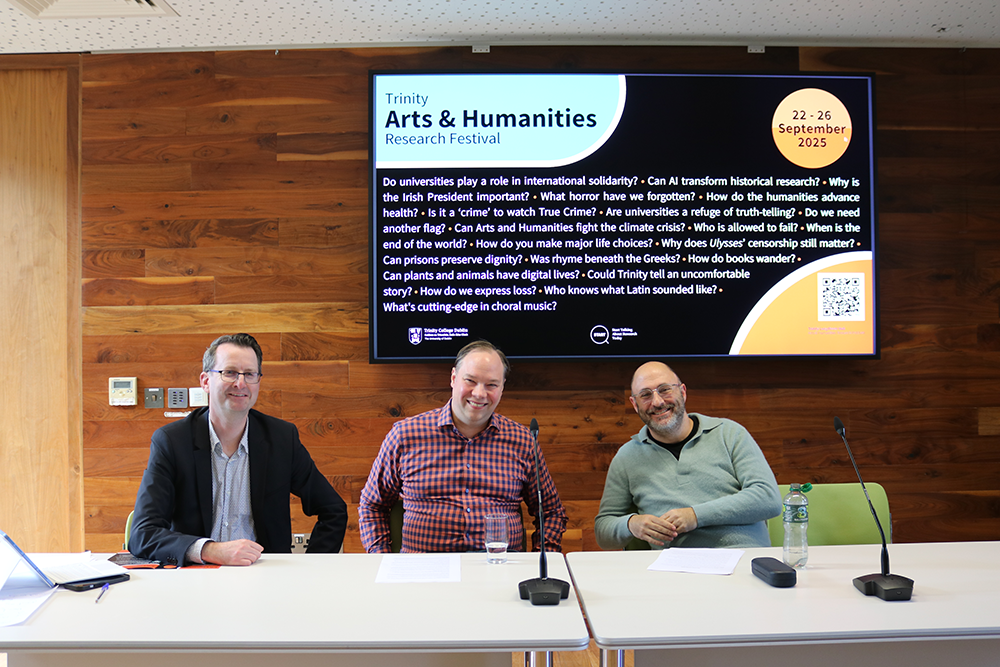
Patrick Geoghegan, Daniel Geary and Gillian Frank (History)
On American history, Professor Daniel Geary (History), put a spotlight on the history of American liberalism, and the topic of a collection of essays he is currently editing on American liberalism due to be published in 2026. Arguing that what is happening today is “not the end of history”, he spoke about the vibrant tradition of liberalism that endured across the 20th century in the United States from Sanders’ campaign in 2020 to Jessie Jackson’s 1980s campaigns.
And, of course, there were lots of books: Is it possible that Ireland was a refuge for books at the end of the Roman Empire? This was one of the questions of Trinity Centre for the Book’s ‘Wandering Books Showcase’ which heard from staff and PhD researchers working on the project of the same name. Speaking of the theory that Ireland became a safe haven for all the classics after the fall of the Roman empire and the widespread looting of monasteries on the continent, Dr Immo Warntjes (History) asked “did we really save civilisation and what does that mean?” And what about the books written by Irish scribes on the continent? Looking at examples from Bobbio and St Gallen, Dr Warntjes touched on the many pieces of the puzzles which has to do with deciphering the transmission history of text during this period.
What was Irish Republican Michael Davitt’s favourite colour? And what happens when you find books with pieces cut out? These were just some of the questions posed by librarians and staff from Trinity’s Library for a favourite festival segment ‘Trinity Library Quick Picks’. Featuring recipes (Clare McNulty), Windmills and watermills in medieval Dublin (Estelle Gittins), Outreach to Tallaght about the Book of Leinster (Sean Adderly), mutilated books in the Fagel Collection (Ann-Marie Hansen), and the Maps and the mythical island of Hy-Brasil (Margaret Masterson), there was something for everything in this expedition of Library collections.

Maggie Masterson, Estelle Gittins, Clare McNulty, Ann-Marie Hansen, Ciara Daly, Shane Mawe, and Sean Adderley
On Thursday, forgotten Gothic and Horror stories was the subject of discussion when Bernice Murphy (English) brought together Trinity literary experts Darryl Jones, Orla Donnelly, Dara Downey and Janice Deitner. Listen back to the podcast now to find out who the overlooked talent is and what might be next on your reading list!
Is the profession of a theatre critic a dying trade? And how might this impact literary history? These were some of the topics explored by Dr Max McGuinness (French), author of Hustlers in the Ivory Tower: Press and Modernism from Mallarmé to Proust, as he told festival-goers about his experiences as a theatre critic on Broadway and in Dublin.
We also thought about wellbeing differently: From the idea that mourning is a social and cultural determinant of health (Shannon Mora, Digital Humanities) to using the creative arts to unveil childhood experiences of childhood grief (Sarah Jane Scaife (Drama), Conor McGuckin and Aoife Lynam (Education)), these festival discussions illuminated how the humanities and health are so intricately connected.

AHSS Faculty Dean Carmel O’Sullivan, Conor McGuckin, Sarah Jane Scaife, Aoife Lynam and Shannon Mora
This was also the topic of the festival edition of the Medical and Health Humanities, where new co-chairs of the research network and seminar series Mandy Lee (Medicine) and Dr Georgina Laragy (History) talked about the idea of human flourishing, and how “the arts and humanities are not the entertainment wing of medicine.”
“Is there always a man-made element to famine?” That was one of the questions posed during ‘A conversation about famine in the Middle East, past and present’, with Dr Tylor Brand (Near and Middle Eastern Studies) and Dr James Hanrahan (French). Drawing on examples from Lebanon’s Great Famine during the first World War to present-day Gaza, the speakers talked about the difference between lack of food and access to food, and the effects of malnourishment over a long period of time, requiring careful and slow recovery.
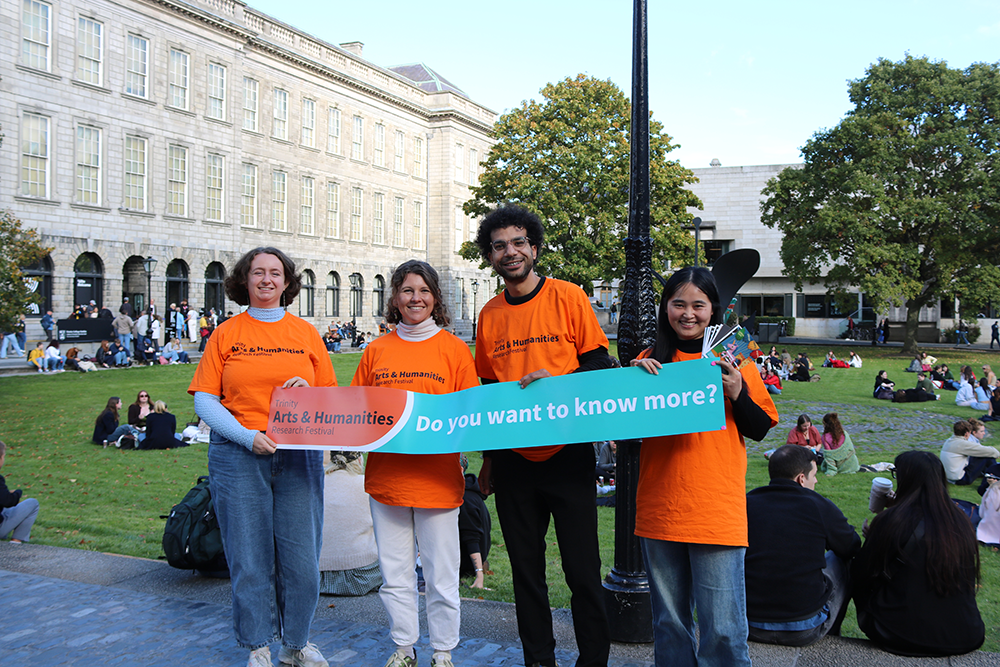
Festival ambassadors on Fellows' Square: Zoe Patterson (English), Emily Cunniffe and Ahmed Ellaboudy (Law) and Shasha Tong (Linguistics).
We invited people to talk about failure: when is failure just bad, and should it really be considered a step to success? How has Samuel Beckett’s infamous quote been appropriated by “tech bros” or in Silicon Valley circles? And who is really impacted when companies or policy makers “fail better” and bigger? To probe these questions, we took to the long-table format, where everyone is invited to take a seat. Dinner-table rules apply, and as hosts Dr Kryzstof Rowinski (Polish Studies) and Dr Nicholas Johnson (Drama) invited guests to explore failure as a phenomenon in its own right despite the cultural and narrative impulse to redeem failure.
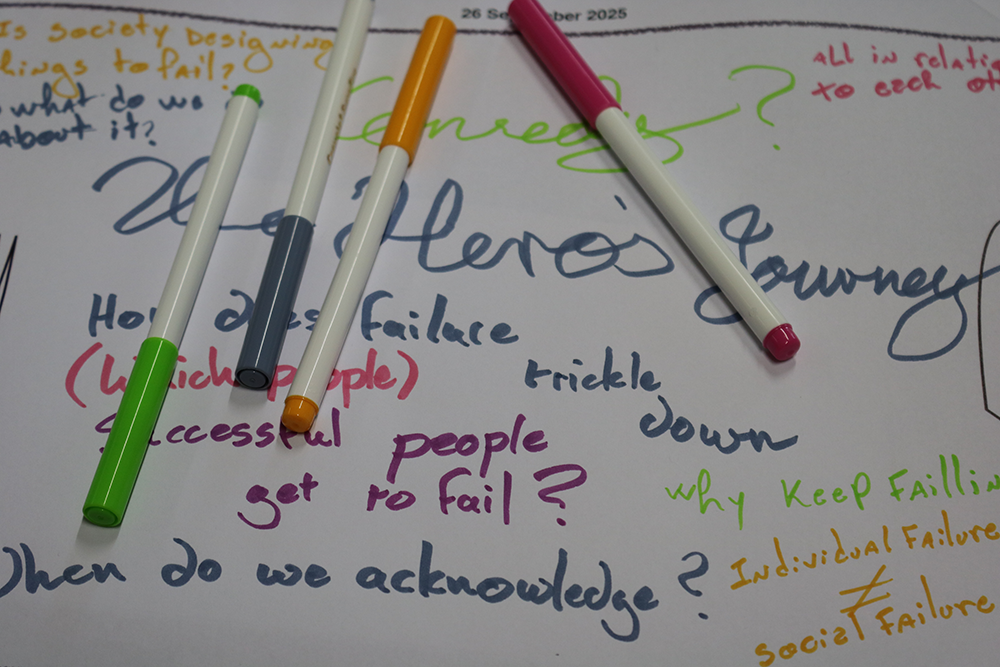
Audience reflections at the Failure long-table
Early career researchers are doing things differently: Across the festival week, the ‘Thesis in Five’ presentations showcased the unique topics and approaches PhD and Postdoctoral candidates are taking in their own research journey. From classics to History, and Linguistics to Law, we heard from over 20 participants.
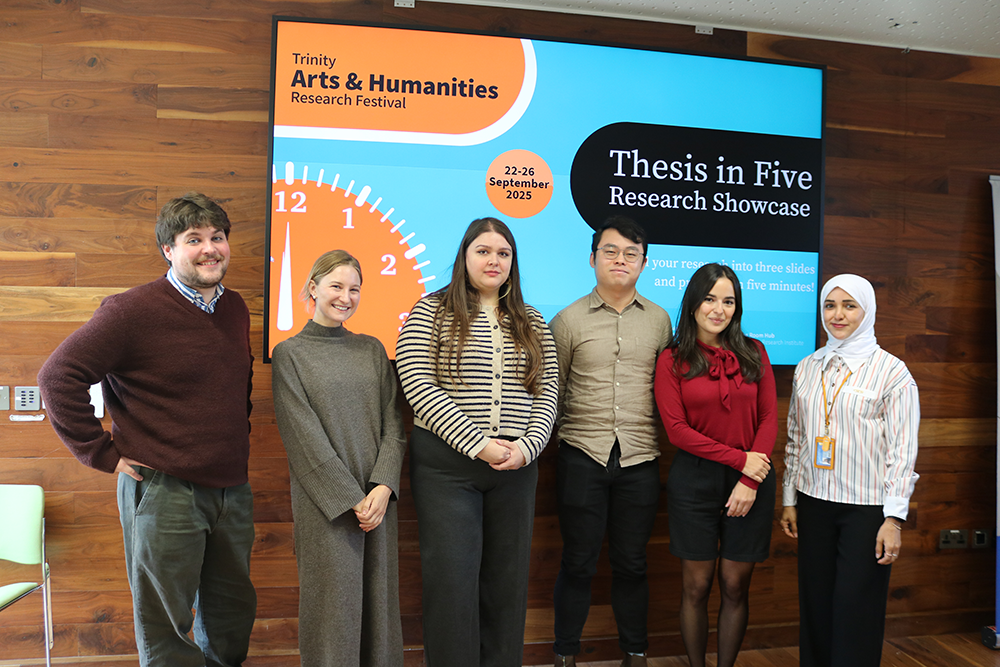
Ronan Daly (History), Kristen Poli (English), Dora Leu (Film), Dexter Tse (History), Mia Panacotti (Classics), and Hanan Almohideb (Linguistics).
How early career researchers are using creative practices to bring their research questions to life was particularly striking as Dora Leu and Sharron Heffner (Film Studies) described using film as a final output for their theses. From the School of English, festival attendees heard how PhD candidate Kristen Poli will write a novel as part of her doctoral thesis entitled ‘Exit Strategies: Anorexia, Alternate Realities, and Narrative Power in Contemporary Fiction’. In Thursday’s coffee morning researchers Irene Barbotti and Maicol Cortes (Biblical Studies) spoke about their plans for ‘Behind the End’, a new interdisciplinary podcast project in collaboration with the Trinity Long Room Hub to explore apocalyptic narratives from several different perspectives.
Who would put breastfeeding, philosophy and Berkeley in the same sentence? Well, Trinity Long Room Hub visiting researcher Clare Moriarty (Philosophy) sat down with Professor Patrick Geoghegan to explain how she writes about motherhood, pregnancy and Berkeley for the Irish Times and why she thinks it’s right that Berkeley, the subject of her doctoral research is being ‘cancelled’.
Miguel Andriolo
For Friday's poster showcase, early career researchers shared the approach they took in illustrating their central research question, with just a short caption and a striking image. And to end the festival week, Miguel Andriolo, a PhD candidate in Classics went a step further in bringing to life the work of roman poet Virgil with an oracle for each and every member of the audience. In one of 33 cards the audience might have chosen, Miguel cautions readers to not be daunted by Virgil, but to “realise that learning about ancient cultures gives you more tools to conceive of your own world, to appreciate its beauties, and to cry its misdeeds, just like all of the ancients did.”
Perhaps that’s as good as any a place to end this year’s Arts and Humanities Research Festival! Thank you to the dozens of students and staff who contributed to making this year’s programme so special and to all who joined the conversations.
Listen back to our festival playlist now:

